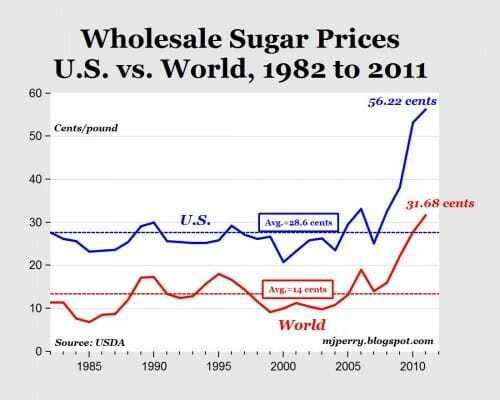Protectionism -- The Worst Form of Crony Capitalism
Food activists on the Left often point to the use of High Fructose Corn Syrup (HFCS) as one of those failures of capitalism, where rapacious capitalists make money serving an inferior product. But HFCS resulted from a scramble by food and beverage companies to find some reasonable alternative to sugar as the government has driven up sugar prices through a crazy tariff system that benefits just a tiny handful of Americans, and costs everyone else money
For the last 10 years or so, HFCS-42 has actually traded at a price higher than the world market price for sugur, but lower than the US price for sugar. There is a lot complexity to prices, but this seems to imply that HFCS would not be nearly as attractive a substitute for sugar if US sugar tariffs did not exist (not to mention subsidies of corn which support HFCS). This can also be seen in the fact that HFCS has not been used nearly so often as a sugar substitute in markets outside of the US, even by the same manufacturers (like Coke) that pioneered its use in the US.
President Obama used a lot of his state of the union address again teeing up what sounded to me like a new round of protectionism. Protectionism is the worst form of crony capitalism, generally benefiting a handful of producers and their employee to the detriment of 300 million US consumers and any number of companies that use the protected product as an input.

Thank you for this article :)
The state of the union worried me on exactly that notion as well - protectionism is one of those weird things the US as the icon of capitalist states worldwide ought not to engage in but turns out to be a world leader thereof...
The HFCS factoid is a wonderful talking point, I'll have to read up on that.
This is very true.
However technically it is not a tarriff (in fact the sugar board will tell you no federal subsidies are given to sugar)
What they do is restrain trade, by allowing only 40% of our sugar needs to come from imports.
States with sugar producers have a strict quota to meet, if more sugar is produced than quota the sugar can not be sold. States without sugar producers aren't even allowed to get involved since the quota is based on last years output.
Want to start growing sugar beets in Iowa for sugar production - fagedaboutit, you won't be allowed to sell them for anything other than pig feed.
Protectionism for the sugar industry has long been a sore point with me. Sugar cane in Florida has been an ecological disaster resulting in the destruction of large parts of the everglades.
American corn and sugar policies are a racket, plain and simple. A racket that costs ordinary Americans in their health and their wallet. Still, at least corn subsidies are finally dying a long overdue death: http://usnews.msnbc.msn.com/_news/2011/12/29/9804028-6-billion-a-year-ethanol-subsidy-dies-but-wait-theres-more.
We really could use a separation of corporations and state like we have with church and state, because when government and corporates get into bed together the results are universally ugly distortions like this.
@Globalmitch the Sugar trade restrictions and quota system, also acts as a subsidy for corn farmers, making HFCS more pricy in the market than it normally would be.
Not that there are not good uses for HFCS - you need it to make pecan pie for instance.
@Globalmitch I like the snarky comment at the end of that article about needing to get rid of "petroleum based subsidies from the 20th century."
I am all for that too, but if they think allowing oil companies to use FIFO accounting as anyone else can, as Warren pointed out in his blog a few months ago, is a subsidy, i think they should all go home.
The causation is backwards. Sugar subsidies have been pushed through by corn state senators and ADM. The sugar lobby is nothing but a front for Big Corn, set up to protect HFCS.